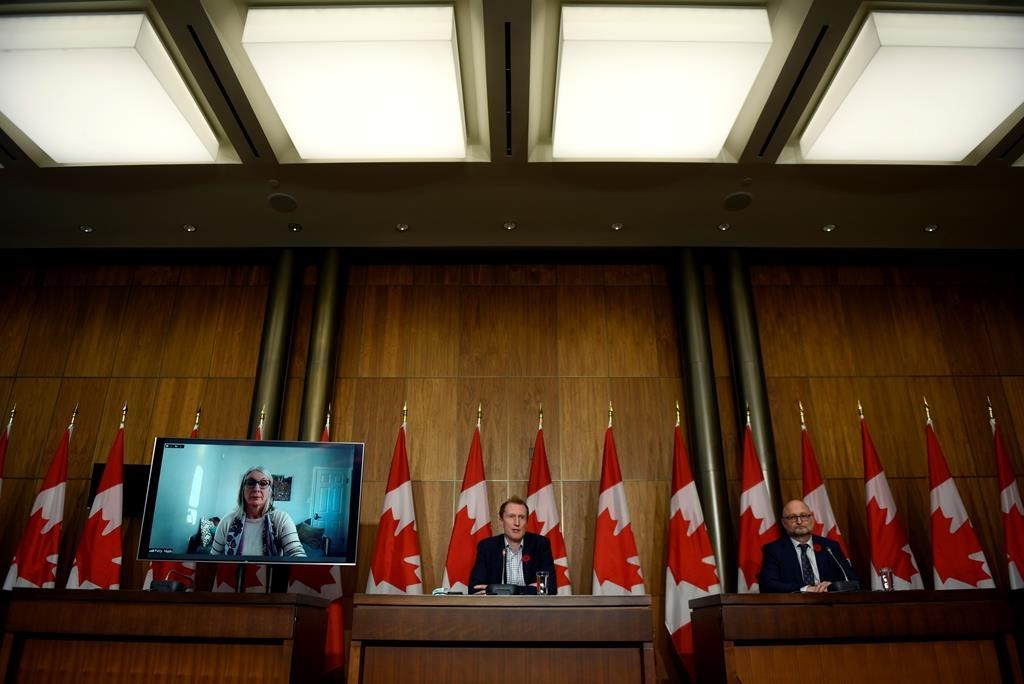Support strong Canadian climate journalism for 2025
OTTAWA — Federal ministers and the Assembly of First Nations expressed disappointment Tuesday as the Canadian Human Rights Tribunal decided against approving a historic, $40-billion child-welfare settlement agreement.
In a summary of a decision released that afternoon, the tribunal urged the parties to continue negotiating.
"This decision is so devastating," the assembly's Manitoba Regional Chief Cindy Woodhouse, who was part of negotiating the package, said during a press conference in Winnipeg.
"I don't think that the Canadian Human Rights Tribunal considered the major implication that this is going to have," she said.
"This decision is so devastating to so many people today and for First Nations and Canadians who want to see a better system."
The finding has now thrown the landmark settlement — the largest in Canadian history — into question.
In 2019, the tribunal ordered the federal government to compensate children and families. The ruling came three years after its verdict that Ottawa had discriminated against First Nations children for years by not properly funding child-welfare services on reserves.
The federal government, Assembly of First Nations and lawyers for two related class-action lawsuits announced a deal to pay that compensation in January.
The $40-billion package was split up into two parts: $20 billion to compensate First Nations families for harms caused and $20 billion to make long-term reforms to the current system.
The tribunal awarded $40,000 for each child who suffered under the system.
However, in the summary of its decision, the tribunal expressed concerns around the timeline for claimants to opt out of the compensation program and whether all children will indeed receive the full $40,000 it says they are owed.
The parties who negotiated the settlement had been awaiting word from the tribunal as to whether it would green-light the package, which must also be approved by the Federal Court.
The tribunal says that some of the victims who should be awarded payment according to its earlier ruling "have been removed or provided with reduced compensation" under the proposed compensation arrangement.
The First Nations Child and Family Caring Society had raised such concerns to the tribunal and welcomed Tuesday's decision, stating it doesn't believe any child should receive less than what the tribunal originally ordered.
Cindy Blackstock, the executive director of the group that first brought the matter to the tribunal, had previously said that the agreement would see some victims receiving more than $40,000 and others receiving less — a situation she found unacceptable.
"We believe the tribunal's decision is a step in the right direction toward reconciliation," the organization said in a statement Tuesday.
"Our expectation is that Canada immediately pays all financial reparations and supports owed to victims who have suffered so gravely and waited so long."
Longtime New Democrat MP Charlie Angus also said the decision sent a clear message to the federal government, which he said has been trying to "ignore their responsibility."
"This accord cannot rest on the principle that the government can choose to ignore certain children," Angus said.
Woodhouse says that more than 300,000 families had been hoping to see the settlement approved by the end of the year.
"I don't know when or if compensation will flow to these kids and families at this stage. We have come so, so close to compensation finally reaching our people. And today's ruling is a significant, significant setback," she said.
Attorney General of Canada and Justice Minister David Lametti says that as a next step, the federal government will wait for the tribunal to release its full decision and identify the issues within it.
Lametti said Tuesday that the government will continue working with First Nations leaders to find a solution and there is "no final decision on anything today."
This report by The Canadian Press was first published Oct. 25, 2022.
— With files from Brittany Hobson and Marie-Danielle Smith





Comments